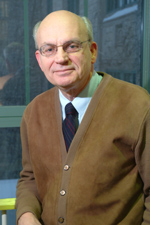
Dudley S. Childress, PhD, professor emeritus of Physical Medicine and Rehabilitation, passed away on August 6. He was 79.
During his 47 years at Northwestern University he worked to advance prosthetic, orthotic and assistive device technology.
“Dudley was a true pioneer in biomechanics and rehabilitation engineering,” said Eric G. Neilson, MD, vice president for Medical Affairs and Lewis Landsberg Dean. “His contributions to the fields of medicine and engineering have made a lasting and significant impact on rehabilitation patients here and around the world.”
Childress became the first biomedical engineer appointed to a joint faculty position in the medical and engineering schools at Northwestern. Under his direction, the first systems were developed to control power wheelchairs by switches that are activated by sipping and puffing on a tube or using other minimal movements. His group developed one of the first environmental control systems enabling persons with paralyzed hands and arms to activate electrical devices such as lights and appliances.
In 1998, Childress and his colleagues developed a state-of-the-art motion analysis system, one of a few such research tools dedicated to studies of prostheses, orthoses, and other ambulation and manipulation aids.
He also served as director of the Prosthetics Research Laboratory and the Rehabilitation Engineering Research program, and a senior rehabilitation research scientist at the VA Chicago Health Care System.
Among his numerous awards and recognitions, Childress received the Paul B. Magnuson Award for Outstanding Achievement in Rehabilitation Research and Development in 2002, the VA’s highest honor for VA rehabilitation investigators. He was elected to the Institute of Medicine of the National Academy of Sciences in 1995.
“Dudley Childress was a remarkable man,” said Elliot Roth, MD, chair of Physical Medicine and Rehabilitation. “Many of the practices and devices that people with disabilities and professionals who care for them use today in daily practice were derived directly from Dr. Childress’ ideas, products, projects and research findings.
“He was both creative and methodical in his approach to research and development, and therefore highly productive during his career. He also was a kind, personable and generous man, who was passionate and principled about mentoring trainees and junior faculty, expanding the role of engineering in medicine, creating an academic environment in which both scientific inquiry and social benefit are valued, and mostly enhancing the quality of life for people with disabilities. He meant a great deal to a large number of people, and his impact will continue to be felt by others in the future.”
Childress earned his bachelor’s and master’s degrees in electrical engineering at the University of Missouri. Before completing his graduate degree at McCormick in electrical and biomedical engineering in 1967, Childress was an assistant professor of electrical engineering at the University of Missouri.
He is survived by his wife, Nancy, and two children. A memorial service is planned for September.






